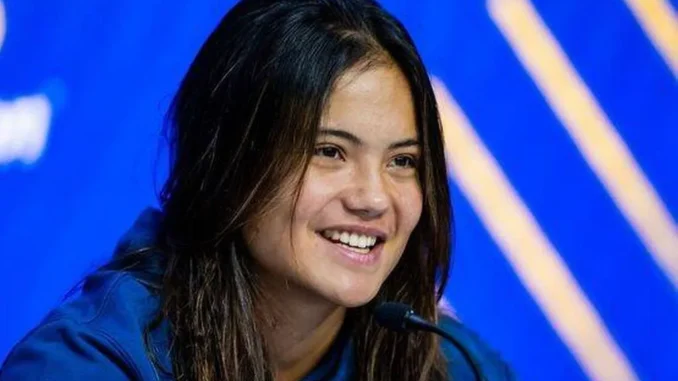
In the high-stakes crucible of Grand Slam tennis, where ambition meets reality under relentless pressure, Emma Raducanu has turned setbacks into stepping stones. The 22-year-old British star, whose 2021 US Open triumph as a teenage qualifier remains a historic milestone, returned to Flushing Meadows in 2025 with renewed belief. A commanding straight-sets win over qualifier Maria Matei and a hard-fought 6-3, 7-5 victory against 21st seed Ekaterina Alexandrova in the early rounds sparked hopes of a deep run, echoing the magic of her breakout year. But the third round brought a harsh reality check: 2022 Wimbledon champion Elena Rybakina, the ninth seed, overwhelmed her 6-1, 6-3 in just 70 minutes. Raducanu’s serve crumbled early, and her groundstrokes faltered against Rybakina’s relentless precision. “She came out firing—I was broken at love right away, and it snowballed,” Raducanu said, her tone calm but tinged with the sting of missed opportunities. This marked her fourth consecutive third-round exit at majors in 2025, each a clash with a top-10 giant: Iga Swiatek’s 6-1, 6-0 routs at the Australian and French Opens, Aryna Sabalenka’s straight-sets win at Wimbledon, and now Rybakina. Yet, from the wreckage of New York, Raducanu forged a clear ambition for 2026: earning a seeded spot at the Australian Open to dodge the early-round titans that have repeatedly halted her progress.
This goal is no mere dream—it’s a calculated necessity. Now ranked around No. 32 in the WTA, a remarkable climb from her injury-ravaged 2023 low of sub-300, Raducanu has posted a 27-19 record in 2025, including upsets over Naomi Osaka and Victoria Azarenka, and earned $1.36 million in prize money. Her emotional breakthrough at the China Open in Beijing, where a grueling three-set win over Jaqueline Cristian secured her top-32 status, was a tearful milestone. “This means everything,” she whispered after the match, aware that seeding could shield her from the draw’s early dangers. Reflecting on her US Open loss, she noted the challenge of facing top-10 players like Rybakina, whose 120 mph serves and 78% first-serve win rate exposed the gap in Raducanu’s evolving game. With only three of her 18 career top-10 wins coming at majors, the unseeded gauntlet remains a formidable hurdle. “You learn from these matches, but it’s tough when you’re up against the best so early,” she said. Her solution? A top-32 seed for Melbourne to gain breathing room and build momentum. “Seeding at the Australian Open is a big target—it gives you a chance to settle in before facing the heavyweights,” she explained.
Raducanu’s plan is already underway, with a late-season push through Asia’s hard-court swing to secure the 1,000+ ranking points needed for seeding. Fresh off Beijing’s high, she’s targeting the Wuhan Open, a WTA 500 event where the fast indoor courts align with her aggressive returns and sharp net play, refined under coach Francisco Roig since August. “Wuhan’s a big stage with big points—I’m going there to keep building,” she told her team, undeterred by her New York exit. Next is Tokyo’s Pan Pacific Open, where she’ll face top players like defending champion Qinwen Zheng and Rybakina herself. These tournaments are critical for consistency, her 2025 mantra, as seen in her Australian Open third-round run—her best yet—where she outlasted Alexandrova and Amanda Anisimova before falling to Swiatek. “I’m learning what I need to improve,” she said in Melbourne, a mindset that fuels her now.
Beyond the court, Raducanu’s growth is evident. Fitness coach Yutaka Nakamura, who trained Maria Sharapova and Osaka, has bolstered her endurance, lifting her serve to a 68% success rate and adding tactical nous through doubles with Rybakina in Washington. Off-court challenges—a stalking incident in Dubai, a split with Vodafone—haven’t dimmed her focus. British tennis legend Tim Henman sees her trajectory clearly: “Top 30 is within reach, and seeding at majors is next. She’s got the talent—it’s about stringing it together.” For Raducanu, seeding isn’t just tactical; it’s mental relief from the grind of early-round epics. “I’m focused on building my game, not chasing titles yet,” she said in New York, tempering expectations with pragmatism. “To win a major, you have to beat everyone eventually, but right now, seeding is my priority.”
As she heads to Wuhan and Tokyo, Raducanu’s US Open loss is not a defeat but a spark. Her journey from Flushing Meadows to Melbourne’s hard courts embodies tennis’s relentless grind: each setback a lesson, each goal a challenge. With her silken slices and powerful forehands, she’s not just chasing a seed—she’s crafting a lasting legacy, one determined rally at a time. In a sport where resilience defines greatness, Raducanu is proving she’s built for the fight, her eyes locked on the horizon.
Leave a Reply